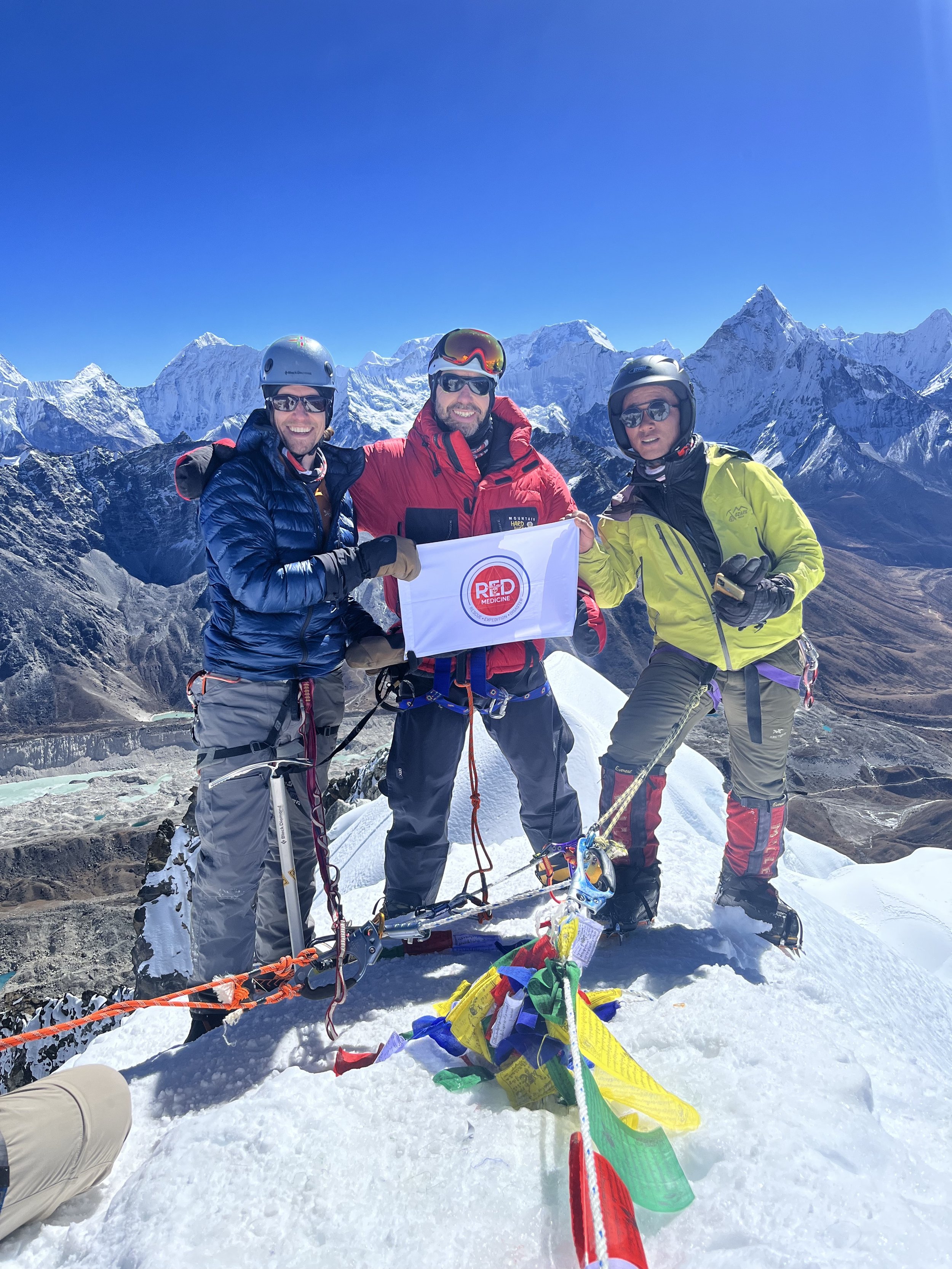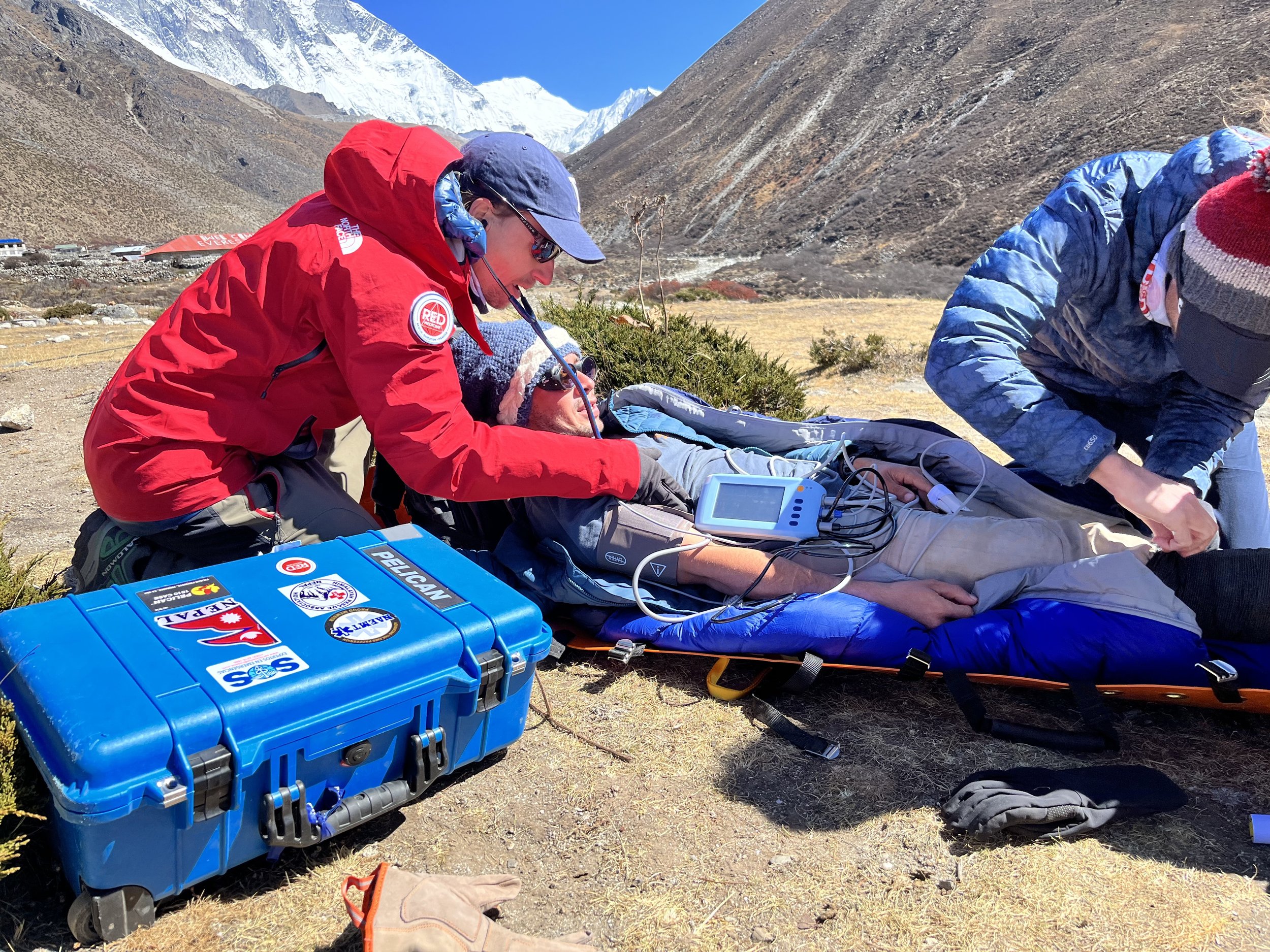Combining Adventure Travel & Continuing Medical Education
The RED MED course is designed to provide current healthcare professionals with a knowledge framework and experience to prepare for RED MED operations and to safely integrate into any Rescue, Expedition or Disaster management team.
This course is ideal for healthcare professionals who are currently working in or striving to work with Rescue, Expedition and Disaster Response Teams in wilderness and austere environments.
The course reviews the fundamentals of risk management, personal preparation and operational planning, along with a review of specific illnesses and injuries often seen in remote and austere environments.
Concept
The hybrid RED MED course include online learning modules, followed by an on-site adventure-based course. The online course provides the core content and additional reading, whilst the on-site phase uses the flipped-classroom approach: we work as a group, learning and developing through discussions, skills sessions and scenario-based exercises in context.
Practice RED MED in-context in the mountains
Kickstart your expedition medicine career: Combine remote and austere medicine with mountaineering skills training and a high altitude summit
Key topics:
The course includes the following topics through a pre-course distance review of the didactic material, onsite lectures, table top exercises, and real-world scenarios in context, whilst travelling in the Himalayas:
Roles & responsibilities
Documentation
Risk Management
Operational planning & personal preparation
Helicopter safety
Helicopter short haul
Communications & telemedicine
Equipment selection
Safety & security
Hierarchy of rescue
Search & rescue operations
Infectious disease
Disaster response
Landmines
Point of care ultrasound (POCUS)
Active shooter incidents
Altitude illness, bites and stings, cold injury, bleeding control, heat illness
Crush injury, suspension syndrome
Throughout the course participants will be actively involved in simulated search and rescue scenarios, operational planning, improvised and prolonged field care and evacuations high-altitude and extreme cold environments
Location: Nepal
Duration: 21 days
Dates: 23 October - 10 November 2025 (Arrive 22 Oct. Depart 11 Nov 2025)
COMPLETING THIS COURSE YOU WILL:
Learn the latest practical hands-on wilderness medical skills for patient assessment, stabilization and evacuation.
Learn the essential preparatory and safety information to integrate into and operate with a rescue, expedition or disaster response team
Practice your skills in live scenarios
Current WMS FAWM candidates will be eligible to receive FAWM credits*
Earn 47.75 AMA PRA Category 1 credit(s)™ **
* “This course has been approved for Fellowship in the Academy of Wilderness Medicine (FAWM) credits through the Wilderness Medical Society. Actual credits awarded depend on personal credit needs and history.”
**“The Wilderness Medical Society designates this enduring material activity for a maximum of 47.75 AMA PRA Category 1 Credit(s)TM. Each physician should only claim the credit commensurate with the extent of their participation in the activity.
Continuing Medical Education (CME) in-context
“This activity has been planned and implemented in accordance with the accreditation requirements and policies of the Accreditation Council for Continuing Medical Education (ACCME) through the joint providership of the Wilderness Medical Society (WMS) and SOS Medical Services. The WMS is accredited by the ACCME to provide continuing medical education for physicians.”
International Board of Specialty Certification (IBSC) Certified Wilderness Paramedic (WP-C)
SOS Medical Services is an approved continuing education provider for WP-C® Board Certification renewal having met the standards and requirements set forth by the International Board of Specialty Certification for their Rescue, Expedition & Disaster Medicine (RED MED) course.
RED MED Online is approved for a minimum of 16 contact hours of continuing education for WP-C® and online approved review courses
UK Continuing Professional Development (CPD) Credits
This course has has been approved by the UK CPD Group for 47 CPD credits.
TRIP HIGHLIGHTS
Climb a > 6,000m mountain
Mt Everest Base Camp trek
Glacier school, rock and ice climbing training
Remote medicine and operations training, in-context
Enjoy an energetic and experienced team with skills stations, discussions and scenario-based exercises
Experience the vibrant culture of Kathmandu
INCLUDES:
RED MED Course certificate
WMS Fellow of the Academy of Wilderness Medicine (FAWM) credits*
47 Continuing Professional Development (CPD) credits
RED MED uniform patch
RED MED Manual
Airport transfers
20 nights lodging, guiding, meals, manual, and flights (as indicated on the itinerary);
Excluded: All Flights to Nepal, airport taxes, travel insurance, gratuities, alcoholic beverages. Also, does not include additional days of travel or global rescue insurance.
COST:
Trip Cost: US $5,999
Accommodation & Additional single supplement costs:
Throughout the course, the allocated accommodation will be shared. This is not only due to limited hotel space in the remote areas we will visit but also to enhance the group atmosphere and dynamics, meet new people and share the experience. If you wish to have a single room for the duration of the trip, please notify us and we will attempt to facilitate this. The additional charge for single supplement is: $250
HEALTH/VACCINATIONS
Delegates should be vaccinated appropriately (see guidelines on http://wwwnc.cdc.gov/travel/destinations/guatemala.htm ) and consider Malaria prophylaxis.
INSURANCE:
Al participants must have medical and evacuation insurance covering all activities for the full duration of the course. We recommend Global Rescue.
Delegates should be aware this is intended to be a wilderness course in every sense of the word. The team in some parts of Nepal will be self sufficient. This is not a package holiday and the RED team cannot control mother nature. Should our plans be affected by floods, avalanches, earthquakes, or landslides, and the like, we will continue with alternate plans in true expedition spirit, affecting self rescues and problem solving along the way.
Itinerary
1) Arrive at Kathmandu
2) Orientation in Kathmandu
3) Fly to Lukla, trek to Phakding
4) Trek to NamcheBazaar
5) Rest in NamcheBazaar. Acclimatization walk to Everest view hotel
6) Trek to Pangboche
7) Trek to Dingboche
8) Rest in Dingboche. Acclimatization walk to 5000m.
9) Trek to Dzhongla (Optional Rock Climbing Training)
10) Walk to Cho La pass. Snow and ice training
11) Walk to Lobuche high camp.
12) Climb Lobuche, return to Lobuche high camp.
13) Pack up and walk down to Lobuche town.
14) Walk to Gorak Shep, climb Kala Patar to watch afternoon sunset.
15) Walk to Everest Base Camp, return to Gorak Shep.
16) Walk down to Pangboche
17) Walk to Namche Bazaar
18) Walk to Lukla.
19) Return flight to Kathmandu
20) Extra day of rest and celebration in Kathmandu.
21) Flight Home.
The logistics team and climbing guides from Dan Mazur’s Summit Climb team, have a wealth of experience and an excellent safety record.

























































